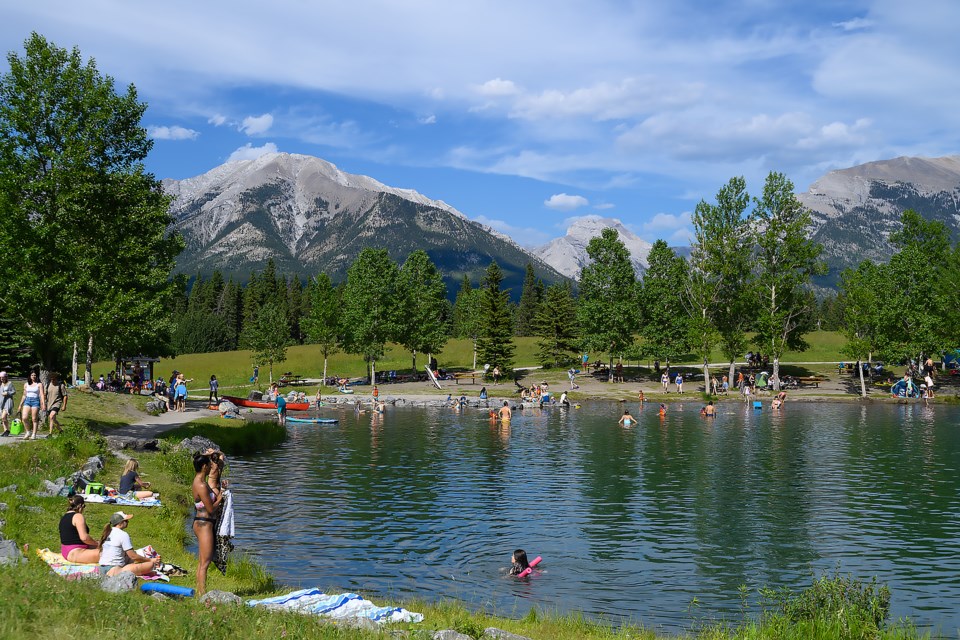BOW VALLEY – A heat wave, comparable in duration to a 2021 heat dome event in western Canada, continues to shatter historic temperature records in the Bow Valley.
Banff and Bow Valley Provincial Park broke three temperature records from Friday (July 19) to Sunday (July 21).
“It’s been a very warm spell for much of the province,” said Environment and Climate Change Canada meteorologist Brian Proctor.
“One of the most interesting things about this event has been the duration of temperatures above what we would consider [heat] warning criteria. We’re seeing some fairly significant durations of warm temperatures – even flirting with the heat dome of 2021.”
Bow Valley Provincial Park set a new record July 19, reaching a high of 33.1 degrees Celsius. The old record was 31.7 C set in 1960. The provincial park set another record July 21 at 33.8 C, with the previous record cast at 32.3 C in 1936.
Banff also set a record July 21 at 32.6 C. The old record was 31.7 C set in 1931.
Much of the Bow Valley area has been under a heat warning with little reprieve since early July.
During the 2021 heat dome, which lasted from late June to mid-July, Banff had its hottest day in recorded history as the mercury soared to 37.8 C on June 29. The next day, the hottest day in history for the Canmore-area was set at 38.2 C.
Both weather stations recorded historic temperatures for six days in a row between June 26 and July 1 during the heat dome event. Records have been kept for Banff since 1887 and since 1928 for Bow Valley Provincial Park, which has the closest weather station to Canmore.
Proctor noted temperatures would have likely rose higher this past weekend if not for smoke cover from wildfires raging in Alberta and neighbouring British Columbia.
Smoke is expected to persist and worsen air quality in the Bow Valley over the coming days, with temperatures expected to drop to the low to mid 20s.
“Smoke has probably reduced the daytime temperatures by a few degrees in a number of localities, otherwise we would have seen even more temperature records that we have been seeing,” said Proctor.
“From a shortwave radiation point-of-view – radiation coming from the sun, or incoming energy – smoke tends to reflect that radiation back into space to a certain degree.”
Banff and Bow Valley Provincial Park each broke temperature records earlier this month, on July 8, at 30.6 and 31.9 C. Those were set in 2017 and 1952.
Starting Thursday (July 25), a “definite and really significant cooling trend” will spread across the northern interior of the province, with areas to the south, including the Bow Valley, seeing a decrease more in line with seasonal temperatures.
“But that’s not likely to be a long-term decrease. We’ll probably see those temperatures pop up again next week,” said Proctor.
A heat warning remains in effect for the entire Bow Valley, including Banff, Canmore, the MD of Bighorn, parts of Kananaskis Country and Îyârhe (Stoney) Nakoda First Nation.
Proctor reminded those residing in or visiting areas affected by the heat warning to be mindful of individual heat tolerance.
“Various people tolerate heat to different degrees based upon what their own physiology is and also based upon what their acclimatization to heat is,” he said.
“The very young and very old, or people with compromised immune systems, really don’t tolerate that heat well. So, it’s really important if you’re out and about, to make sure you stay hydrated – have lots of water available.”
If you’re feeling effects of the heat, seek shelter, and consider seeking out civic buildings that have air conditioning for respite.
Environment Canada also recommends being aware of and checking in on neighbours, pets and livestock.
The Local Journalism Initiative is funded by the Government of Canada. The position covers Îyârhe (Stoney) Nakoda First Nation and Kananaskis Country.




